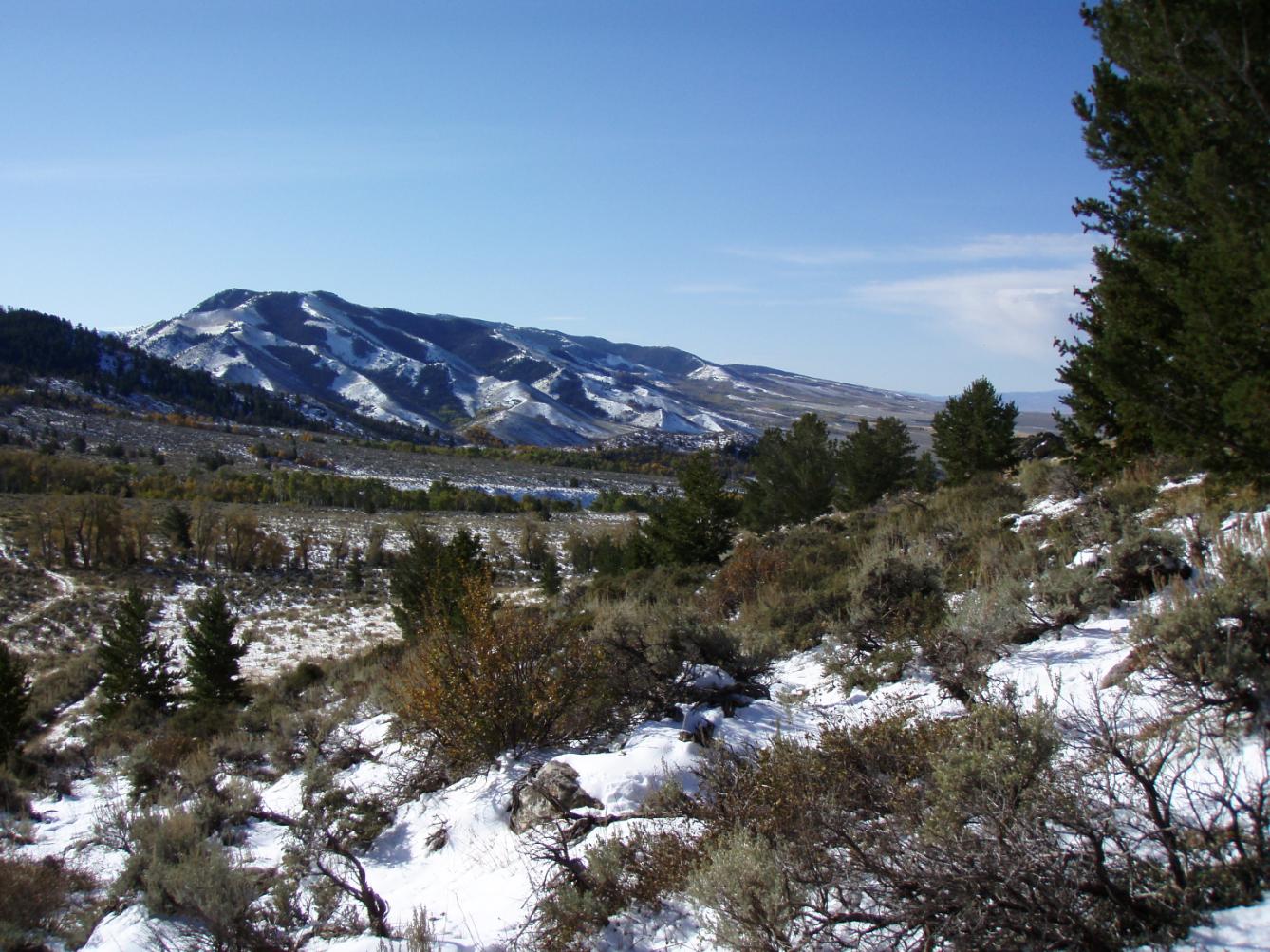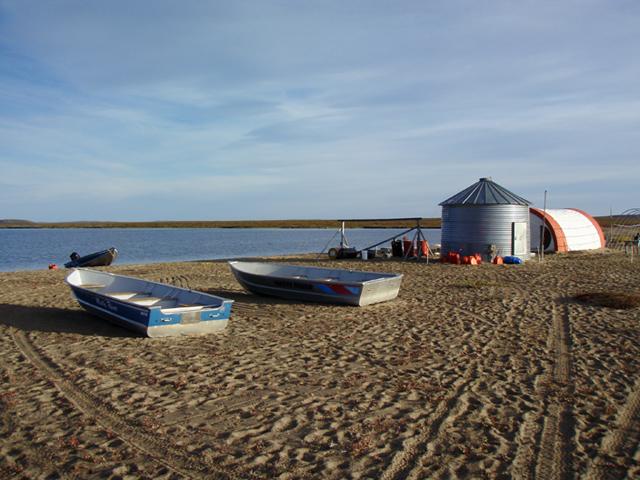30th August
Last night we were drinking and talking until late, which, for us, is all part of the program too. Pat has scheduled breakfast for 7.00, but, of course, at 7.00 we are still tucked up in our sleeping bags. Pat is starting to lose it; to get us all up he switches on the bear-alarm. On hearing it, Ricardo leaps out of his sleeping bag, opens the tent flap and yells out. The essential part of his speech is that if the alarm isn't silenced fast, he will go and shoot the bear himself. He also


Chapter IV.: Caribou hunting in the Northwest Territories
Page 19
includes a familiar four-letter English swear-word several times, in case anyone thinks he was joking. Jake and I laugh helplessly for 10 minutes, lying on our camp beds. I am actually crying with laughter.
Even though it is quite unplanned, we each arrive for breakfast 30 minutes late. We have sabotaged the schedule. At times like this, I just can't help laughing, and I almost choke on my tin of preserved fruit. Just when I've almost stopped, I glance up at the two main saboteurs, who give me a wink, which sets me off again. All this is too much for Pat, who now refuses to say a word to us. If I wasn't in such a good mood, I would say that the atmosphere is decidedly icy.
We really don't get Pat.
Of course, he is responsible for us all, and has to look after everything, but we haven't joined the French Foreign Legion: it's only a hunting camp. We are guests here. And, what's more, it makes no difference if we set out 30 minutes late; our chances of a successful hunt remain the same all day. And if by chance, we decide not to go out at all today, but just sit around picking our noses and breakfasting at noon, we should be able to.
After breakfast, Pat dramatically announces that he has to cut up the meat from yesterday's hunt to a portable size, and that to do this he will require our assistance. I don't want any meat at all.
That's all I need: to drag a cool-box around with me, over half of America. Generously, I donate my stag to the public, so that I do not have to exert myself with all the chopping. My attitude to it all is: the needs of others outweigh mine. So I'll let them do all the work.
Somehow, today the devil is in me, and I start making loud comments to Pat, giving him advice as he works. When they hear me, the archers are forced to retire to have a good laugh, but discrete one. The huge chunks of meat are placed in grease-proof paper, and then put in the freezer, which is powered by a generator. By the time all three stags have been done, the freezer is completely full.
After we'd finished I have a chat with Jake about yesterday's gun testing.
I think my gun is OK now, but I'm not absolutely certain. Jake suggests I take another test shot as I'm still not 100% sure. I don't really wan't to waste any more ammunition from my meagre reserve; but equally, I don't want to test Pat's nerves any further, so I admit that he's right. I'd rather waste a couple of bullets than miss the world record caribou through an error. And, what's more, if I do make a bad shot, I'll have to repeat it anyway, so I'll still use the same amount of ammunition. So, I prepare myself thoroughly for the shot. I try out all my clothes to see which makes the best gun-rest. I finally devise a rest which supports the gun on two points. The conditions are just as good as at the rifle range at Nagytétény. I set up the automatic target once



Chapter IV.: Caribou hunting in the Northwest Territories
Page 20
again, which, just out of habit, I had taken down yesterday. It is usually attached with a staple-gun; Pat, however, is in such a foul mood that I decide to ask another guide for it.
I wait a little for my pulse to settle down, and set up the gun on my clothes. I fire... On a horizontal level, it's dead-on, but just a little bit high. I slightly correct the setting of the sight... fire again...
that's it! That's exactly the result I wanted to see on the target! I shall feel much more confident when I am next in the boat, on a new caribou hunt. Now I know that I have done everything possible to ensure the success of my coming shot.
I say goodbye to the ever-cheerful archers, complete masters of their weapons. I've watched them shoot: what these guys cannot hit with their bows, I would never be able to hit with my gun.
They don't usually shoot from more than 120ft. Not because they're afraid of missing, but because the arrow - unlike a bullet - travels slower than the speed of sound. If they shoot over too


Chapter IV.: Caribou hunting in the Northwest Territories
Page 21
great a distance, the sound of the arrow will reach the animal first, giving it the opportunity to move. Nevertheless, they would still probably hit it, but might only wound it, and, in the ethics of archery, this is unacceptable.
Pat and I continue to hunt in the same way that we did yesterday.
We are in the boat all day. Sometimes we moor it, take a look at a particular caribou, I vaguely belittle it, and then we set off again.
I have to admit that recently I have become rather choosy.
Just the day before yesterday I would have given anything to shoot a bull which now I would pull a face at. Now that I consider myself to be a great caribou hunter, I am more picky - this one isn't quite right; that one's antlers are too close together; and the other is OK, but why isn't it three times the size?... I manage to find something wrong with each one.
At one of our moorings a sub-standard bull appears right in front of us. He stares at us for a long time, thinking; its brain is so slow, it's uncertain what's going on. Pat holds his arms above his head, in the shape of antlers. The caribou reacts at once, coming towards us; with its weak eyesight it can't tell that we are a different species. He should be able to smell us as the wind is blowing towards him. What is the point of this creature having such a keen sense of smell if he has no fear of man and his scent? For him it's all new information; he doesn't know whether to be worried, or not. He's only 60ft. from us when he realises he has made a mistake. Slowly, he turns and walks away, as if he's just remembered something he had to do, and doesn't want his fellow caribou to see how dumb he's been.
Pat and I have barely exchanged more than ten sentences all day. I don't want to censure him; his knowledge of game and the hunting grounds is quite extraordinary, and, in the end, that is what he is here for. However, for me, having a good relationship with the people around me is an important part of the whole experience. But I just can't get on well with him. He is an impatient, unfriendly and bitter man. It can't be easy going through life with no sense of humor whatsoever.
It's hard to get to know someone who doesn't want to talk. So I decide to involve myself with my camera and the beautiful landscape.
There's not a bush in sight, and the ground cover grows no higher than 12 -15ins. Game has nowhere to hide, but, as far as I can see, they aren't particularly bothered by it. They are more surprised than frightened as they watch our boat approach, and they don't run away. They've never seen anything like it.
There are lots of caribou about.
During the day, we've seen at least fifty, and we only left the boat a couple of times to use our spotting scopes. The bulls stand alone or in small groups. I'm a bit worried that if I'm too choosy, I



Chapter IV.: Caribou hunting in the Northwest Territories
Page 22
might blow the hunt completely. If, by some chance, I don't see any at all tomorrow, then I'll have only myself to blame for returning home with just one trophy.
We moor the boat again. Looking through my binoculars, I can see a boat appear, far away. Pat has seen it too, and is on the radio at once - if he's not on the radio to the other boat every half-hour, he feels deprived - and learns that they are just fishing.
They are just fishing.
Well, they can't have much to worry about.
We join them and all go back to the camp together. Jake has shot his second bull, and it's even better than his first. It is a really beautiful specimen, and even more beautiful is this shared joy of hunting!
My antlers are behaving very strangely - they've started to grow. More and more people have come up to me to say that they think these are huge antlers. They are the biggest of the four that have been bagged so far. I'm delighted to hear it, and, as I look at them, they just seem to get bigger and bigger. No doubt about it, I'm a lucky guy.
We discover that there used to be a shower in the camp, but some evil bear destroyed it. So whoever has a burning desire to have a really thorough wash can only do it in the Wolf. Needless to say, there are no lines forming on the shore.


Chapter IV.: Caribou hunting in the Northwest Territories
Page 23
It's very stinky inside the tent.
The combined smells of old socks, drying boots, and unwashed bodies is a normal part of every expedition camp, and is nothing new to me. And anyway, as mountaineers say: "Where it is stinky, it's warm". But the smell inside this tent is too much, even for me. It's as if someone has crapped in here. Attempts to air it are in vain, and only bring a momentary relief.
For dinner we have freshly-caught fish and caribou.
Jake brings out his whisky; his reserve has still not run out, it seems. We start drinking again.
White Wolf Lake
Caribou Camp















